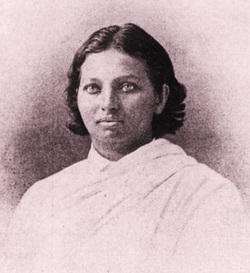
Because of her extraordinary learning, as a teenager she was brought before the great Pundits (learned men) of Calcutta, and given the name Pandita (goddess of wisdom). At age 22 she was married and they had a little girl, but she was tragically widowed only 3 years later.
In 1887, Pandita wrote a book exposing the awful plight of Hindu widows who were often as young as 10 years of age. This launched her in to the limelight internationally as it sent shock waves around the world. It opened the door for Pandita, together with her little daughter, to further her education in England. Clearly this was the will of God as it was in England that she encountered, at first academically, the Christian faith, but then very personally, the Lord Jesus Christ. She poured over the Bible and hungered to take the Gospel back home.
After 5 and a half years away from India, Pandita returned with a burning desire to do something for the poor, despised little Hindu widows of whom there were 23 million in India—many of whom lived in the forests, hiding from family violence. The idea of a school, training centre and home for these little ladies was birthed.
You’d imagine that it would be easy to bring these young widows in to be fed, housed and trained but they were told by heathen that the Christians wanted to feed them up to harvest human oil from their burning bodies! But with God on her side, the school grew from 2 to 750 and by 1900 she was feeding 1800 daily and had around 2,000 girls on the school or training centre (Mukti) register.
In 1898 Ramabai was visiting England and attended the Keswick Convention where she went forward for prayer for an outpouring upon Indian believers and pleaded for 1,000 Holy Ghost-filled missionaries. When she heard about a revival in Australia led by R.A. Torrey, she sent her daughter, Manoramabai there to experience it.
Manoramabai returned to tell her that the keys to revival were prayer and a poured-out life, so Pandita began to call daily, early-morning prayer meetings and prayed specifically for: “…true conversions of all Indian Christians including ourselves, and for a special outpouring of the Holy Spirit on all Christians of every land”.
The outpouring began right there in 1905 and lasted one and a half years. This was a true Pentecostal Revival. An eye witness account of a meeting at the Mukti reports of an uneducated girl praying out distinctly and fluently in English (by the Spirit of God). The Mukti saw supernatural provision and protection. During most of the early years severe famines struck India yet the Mukti (‘Place of Salvation’) always had their needs supplied. In the years when bubonic plague ended the lives of countless thousands the plague never affected the Mukti. Instead the Women of the Mukti affected untold numbers. During the revival time 1,100 girls were baptised at the school alone; 700 women went out as missionaries; a Bible school was formed with 200 students who then formed smaller prayer bands which went out in small groups to pray and evangelize (on foot) throughout India. These women saw great miracles, healings, signs and wonders.
Pandita’s main influence was her profound faith in the Bible as the Word of the Living God. Her love for God’s Word was proven by her 17 year long labour to translate the Bible from Greek and Hebrew in to the Marathi language. Pandita Ramabai lived with a single eye to God’s glory.
 RSS Feed
RSS Feed